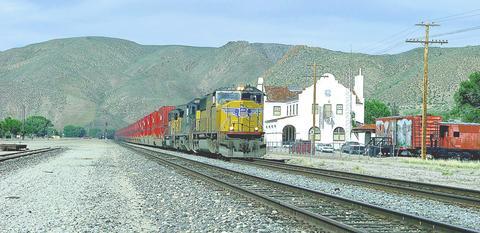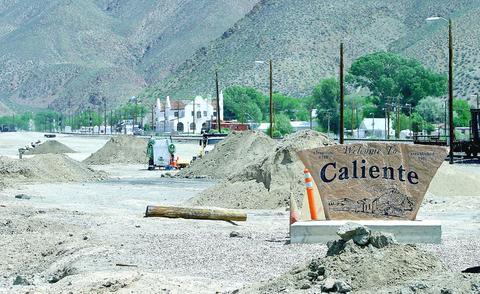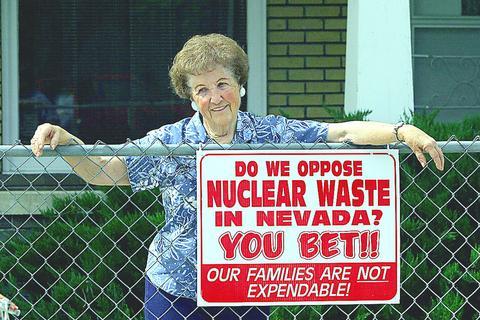This used to be a railroad town with a dozen tracks and a dozen bars and a lot of jobs.
But then the railroad company decided it did not need Caliente anymore. Now, instead of stopping, the freight trains barrel through the middle of town.
Most of the bars are closed, and storefronts on the main street are boarded up, but Mayor Kevin Phillips has figured out a way to lift the fortunes of his struggling hamlet tucked in the mountains about 200km north of Las Vegas. Nuclear waste.

PHOTO: NY TIMES
Phillips, 53, who owns a local hardware store, has volunteered Caliente, population 1,200, to be the transfer station for the nation's spent nuclear fuel that is supposed to be stored in the Yucca Mountain repository beginning in 2010.
Though the repository plan has run into stiff opposition in Nevada, Phillips' idea has supporters, including the federal government, which announced in April that it wanted to run a train through here to carry the waste to its final resting place.
"It would be absolutely safe, with the proper training, and it would bring jobs that we sorely need," said Phillips, who walks around town with a tape measure on his belt. "We rural people don't get all watery-eyed about this kind of thing."

PHOTO: NY TIMES
Phillips, who earns US$190.40 a month as mayor, has become a political lightning rod in the national nuclear waste disposal debate.
Not one major politician in Nevada supports the Yucca Mountain plan, and the "Glow Train" plan, as it is called around here, has split this tiny town down the middle.
Marge Detraz is the mayor's archnemesis, and the person responsible for the "No Nukes" signs on trees and fences around town. Detraz, a 77-year-old widow who offers strangers brownies with nuts, figures she has spent US$125,000 of her own money battling the mayor and the federal government over the train. She and her husband earned that money working at the nuclear test site where the waste is to be stored.

PHOTO: NY TIMES
She is a fixture in the local Mormon church, which Phillips also attends. She considers him a good, spiritual man and compliments him on his skin-tingling oratory. But when it comes to the train, her invective for her neighbor is stinging, referring to him as corrupt, tyrannical and an unwitting tool of forces more powerful than himself.
"If they bring that train in with that nuclear waste, it has the potential to kill all of us," Detraz said. "I mean, the tracks run straight through the middle of town. And the mayor thinks he's going to save Lincoln County with that thing? He's crazy."
Phillips is philosophical about the criticism. "This is no launch pad into senatorial politics, I'll tell you that," he said.
Nukes mean jobs -- maybe 100, maybe 300 -- and Phillips, father of 10, is tired of seeing Caliente children graduate from high school and move down the hill to Las Vegas to find a living. Handled correctly, nuclear waste can be as safe to handle as household garbage, he said.
"What's the picking difference?" asked Phillips. "The government is going to put a rail system in anyway, so why shouldn't we benefit?"
Caliente is on a main line of the Union Pacific Railroad. Dozens of hazardous material shipments come through every day, the mayor said, and there has never been a major accident.
"It's just 50 yards out my front door," he said. "It could take out the whole town, but no one ever complains about that."
The US Department of Energy announced in April that it would prefer to ship nuclear waste to Yucca Mountain by a rail line that would begin in Caliente and wind 500km around the border of the test site and end at the mouth of the repository, about 160km northwest of Las Vegas. The repository would accommodate 77,000 tonnes of radioactive waste from 39 states, none of it from Nevada.
The railroad would cost US$880 million to build, the department estimates, and two loads of nuclear waste stored in casks would run through Caliente each day.
The energy department's announcement is the first significant movement in the debate since US President George W. Bush designated Yucca Mountain as a nuclear waste storage site in 2002, over the objections of Nevada Governor Kenny Guinn. Scientists have questioned whether Yucca Mountain has the structural integrity to hold up for 10,000 years.
Rural Nevadans, libertarian to their marrow, do not trust the federal government, which controls nearly 90 percent of Nevada's territory. It was the government, Detraz pointed out, that said nuclear testing was safe, and so the whole town would come out onto the ridge in the 1950s to watch the above-ground detonations at the Nevada test site with their naked eyes.
People died from mysterious illnesses. Dogs limped around with open sores.
"People back East make the garbage and we got to take it," said Michael Budreau, 38, preparing himself for an afternoon beer since he cannot find work here.
"Nuclear waste will bring money and jobs, that's for sure," Budreau said. And then almost in a whisper, he revealed what he thought the real problem was.
"Jobs will also bring new people, and if anybody around here's talking truthful, they will tell you they don't want them."

On April 26, The Lancet published a letter from two doctors at Taichung-based China Medical University Hospital (CMUH) warning that “Taiwan’s Health Care System is on the Brink of Collapse.” The authors said that “Years of policy inaction and mismanagement of resources have led to the National Health Insurance system operating under unsustainable conditions.” The pushback was immediate. Errors in the paper were quickly identified and publicized, to discredit the authors (the hospital apologized). CNA reported that CMUH said the letter described Taiwan in 2021 as having 62 nurses per 10,000 people, when the correct number was 78 nurses per 10,000

As we live longer, our risk of cognitive impairment is increasing. How can we delay the onset of symptoms? Do we have to give up every indulgence or can small changes make a difference? We asked neurologists for tips on how to keep our brains healthy for life. TAKE CARE OF YOUR HEALTH “All of the sensible things that apply to bodily health apply to brain health,” says Suzanne O’Sullivan, a consultant in neurology at the National Hospital for Neurology and Neurosurgery in London, and the author of The Age of Diagnosis. “When you’re 20, you can get away with absolute

May 5 to May 11 What started out as friction between Taiwanese students at Taichung First High School and a Japanese head cook escalated dramatically over the first two weeks of May 1927. It began on April 30 when the cook’s wife knew that lotus starch used in that night’s dinner had rat feces in it, but failed to inform staff until the meal was already prepared. The students believed that her silence was intentional, and filed a complaint. The school’s Japanese administrators sided with the cook’s family, dismissing the students as troublemakers and clamping down on their freedoms — with

As Donald Trump’s executive order in March led to the shuttering of Voice of America (VOA) — the global broadcaster whose roots date back to the fight against Nazi propaganda — he quickly attracted support from figures not used to aligning themselves with any US administration. Trump had ordered the US Agency for Global Media, the federal agency that funds VOA and other groups promoting independent journalism overseas, to be “eliminated to the maximum extent consistent with applicable law.” The decision suddenly halted programming in 49 languages to more than 425 million people. In Moscow, Margarita Simonyan, the hardline editor-in-chief of the